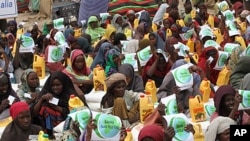The international aid organization Oxfam says thousands of Somali families could be cut off from much needed aid if a U.S. bank goes through with plans to discontinue its money-wiring services at the end of this month.
Last week, a small bank in the U.S. state of Minnesota announced it would stop wiring cash to "hawala" money transfer companies in Somalia because it feared the transfers risk violating U.S. counter-terrorism laws. The laws seek to clamp down on the financing of terror groups.
Shannon Scribner, a humanitarian policy manager at Oxfam, says the support that comes from the bank is crucial and that it is one of the few still offering the service.
"Within Somalia about $100 million in remittances from the U.S. goes to Somalia every year," said Scribner. "And this money comes from diaspora members, who are Somalis themselves that are living in the United States, extended families and local charities."
The cut-off comes when more than a 250,000 Somalis are on the brink of starvation because of famine and political violence. The al-Qaida linked terror group al-Shabab is in a deadly struggle with Somalia's fragile transitional government.
Hawala money transfers rely on an informal system of merchants who send money, for a fee, from one location to another. Because it is informal, the U.S. and other countries worry the hawala system can be used to funnel cash to terrorist or criminal groups.
Studies that have looked at the remittances say funds from the Somali diaspora benefit as much as 40 percent of households in Somalia.
"The majority of [foreign] aid to Somalia is a fraction of what is needed, and so these remittances are really a lifeline for people in Somalia," added Scribner.
Without remittances, Oxfam warns, many Somalis could be forced by famine to go into refugee camps.
Members of the Somali community in Minnesota have protested the bank's decision, but a December 31 deadline to terminate the services is fast approaching.
Oxfam urges the U.S. government, the bank and the networks that handle the funds in Somalia to reach a solution before the deadline. U.S. lawmakers from Minnesota are working to head off a crisis.
Scribner says the bank, hawala merchants, the Treasury Department and other parts of the U.S. government are discussing ways to solve the problem. But, she says, it is not clear exactly who needs to approve a measure to allow remittances to continue that doesn't put banks at risk of violating the law.
"We're saying use due diligence, set up a process that is clear, you can vet it properly, but give these banks some reassurances that they are not going to be liable," said Scribner.
The U.S. wants to makes sure money does not go al-Shabab, one of the most dangerous insurgent groups in East Africa. The group is fighting to overthrow Somalia's transitional government in a bid to impose a strict form of Sharia, or Islamic law.
Just several weeks before the bank announced it would end hawala remittances, two Minnesota women were convicted of conspiracy to provide support to al-Shabab. In early December, a Somali woman was convicted on similar charges in the city of San Diego, California.




